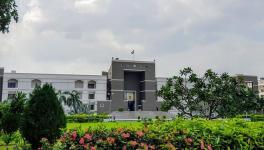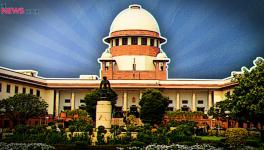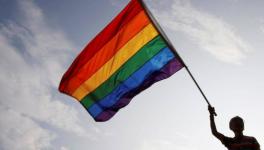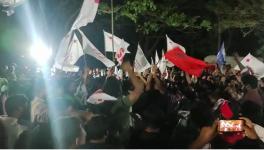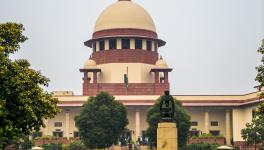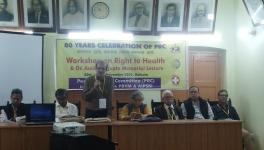‘Need for a Society Where Homosexuality Not Considered Criminal, Socially and Politically’
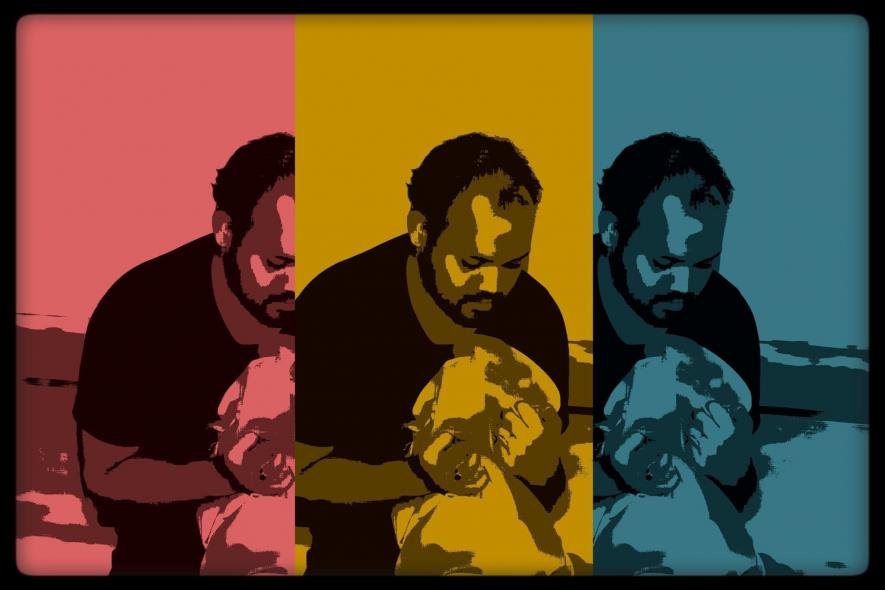
On September 6, 2018, the Supreme Court (SC) of India finally set aside Section 377 of the Indian Penal Code. This section is a residue from the colonial era. It viewed consensual sexual relations between adults of the same sex as a criminal act. Now, such relations are legal. The SC judgment has been widely celebrated by the progressive and democratic section of the country, including activists and members of the queer community of India. Gourab Ghosh was the first openly gay candidate to contest elections at a major university in India. He was the candidate of the Students’ Federation of India at Jawaharlal Nehru University in 2013. Satarupa Chakraborty, Consultant Researcher at Tricontinental: Institute for Social Research, interviewed Gourab Ghosh just after the SC verdict was announced.
What, in your opinion, is the political and legal relevance of the Supreme Court judgment which decriminalises consensual same-sex relationships by scrapping Section 377 of Indian Penal Code?
The judgment has immense political relevance, particularly when we are governed by a right-wing government at the Centre. If you see the statements from the leaders of the ruling party, it clearly shows that they have merely spoken about ‘supporting’ the judgement, carefully articulating it in terms of the constitutional validity of Section 377. What they are essentially denying even after this judgement is giving the people belonging from the LGBTQ any political right. Ensuring political rights of the people who identify as LGBTQ is essential which the ruling government is clearly refusing to accept.
What are the grounds on which the five-judge bench of the Supreme Court has pronounced the judgement?
The five-judge bench emphasised certain basic, but, important aspects. Two judgments, which the judges have referred to in the judgment, are particularly significant: the National Legal Services Authority (NALSA) judgement and the Private Member’s Bill judgement. The NALSA judgment in 2014 declared that to be transgender is to be a ‘third gender’, and so, a transgender person has all the rights granted by the Indian Constitution. Justice DY Chandrachud, referring to the NALSA case, said, “[S]exual orientation is an essential component of rights guaranteed under the Constitution which are not formulated on majoritarian favour or acceptance.” Justice Chandrachud pointed out a common refrain – ‘a miniscule fraction of the country’s population constitutes lesbians, gays, bisexuals or transgenders’, which assumes that minorities should therefore not receive rights. But then, he said, “[T]he right to privacy cannot be denied even if there is a minuscule fraction of the population which is affected.”
Besides, the Private Member’s Bill, as highlighted in the judgement, recognised that ‘realm of private morality and immorality which is, in brief and crude terms, not the law‘s business’ and therefore, ‘should no longer be criminal’. Hence, the bench underlines:
If Section 377 remains in its present form in the statute book, it will allow the harassment and exploitation of the LGBT community to prevail. We must make it clear that freedom of choice cannot be scuttled or abridged on the threat of criminal prosecution and made paraplegic on the mercurial stance of majoritarian perception.
Homosexuality is often termed by the reactionary sections as a mental disorder. Is there anything in the judgement which addresses this issue?
The judgement looks carefully at the research done on this issue. It categorically points out that homosexuality is not a mental disorder. To quote from the judgement,
The American mental health professions concluded more than a quarter-century ago that homosexuality is not a mental disorder. That conclusion was reached after decades of study of homosexuality by independent researchers, as well as numerous attempts by practitioners in the mental health professions to effectuate a change in individuals’ sexual orientation.
There were assumptions that homosexuality is a mental disorder, as the judgement highlights. However, there is no sufficient proof to establish such assumptions. In fact, those assumptions, as mentioned in the judgement, were proven to be false once they were empirically tested. The Indian Psychiatric Society (IPS) also held the position that homosexuality is not a mental disorder, and that it should be decriminalised. The IPS had said earlier this year, ‘There is no scientific evidence that sexual orientation can be alteredby any treatment and that any such attempts may in fact lead to low self-esteem and stigmatisation of the person’.
Subramanian Swamy, a leader of the ruling BJP, said after the SC judgment that homosexuality is a ‘genetic disorder’. Swami also said, ‘It is the American game. Soon there will be gay bars here where homosexuals can go. HIV will spread. So, after looking at the consequences I hope the next Government will move a seven-judge bench to set aside this five-judge bench order’. What is your opinion on such views?
The response of the party, which is in power at the Centre, always indicated denial of the rights of people belonging to the LGBTQ community. You earlier asked about the relevance of this judgement. It is significant in this context: when leaders of the ruling party have not yet come out from their denial mode. The judgment, however, paves a way for positively looking at the aspect of serious issues like HIV without criminalising homosexuality. It refers to the findings of the Human Rights Committee of the United Nations in Nicholas Toonen v. Australia case, in which the following facts are established:
The criminalization of homosexual practices cannot be considered a reasonable means or proportionate measure to achieve the aim of preventing the spread of AIDS/HIV. The Australian Government observes that statutes criminalising homosexual activity tend to impede public health programmes by driving underground many of the people at the risk of infection. Criminalisation of homosexual activity thus would appear to run counter to the implementation of effective education programmes in respect of the HIV/AIDS prevention. Secondly, the Committee notes that no link has been shown between the continued criminalisation of homosexual activity and the effective control of the spread of the HIV/AIDS virus.
The law is a tool to assertively demand rights such as partnership right, but this in itself will not ensure that there won’t be any social humiliation. As is evident in Mr. Swamy’s statement, there will be all sorts of attempts to socially humiliate LGBTQ people. Thus, it emphasises the need for further, deeper struggles.
As you have been active politically in raising the issues of the LGBTQ, do you think that a movement can be built now after this judgment, demanding fulfilment of the rights of the LGBTQ community?
I do not think that it has become a movement yet, although there have been several protests. This issue is not yet political in a holistic sense. Some are asking for partnership rights, others are stressing on marriage rights, while a section within LGBTQ is happy just with the decriminalisation. The larger concern is to make people aware of the rights of the LGBTQ people, for which sensitisation is needed. With the law in hand, a bigger political mobilisation can happen which may turn it into a movement.
You pointed out the importance of sensitisation. Do you think that the law can be successfully implemented unless our society is politically sensitised?
A law is a law. It gives us the rights and space for legally registering any issue of discrimination. Tomorrow, if the same right-wing government comes to power again, a ruling government of this nature may move a legal petition against the present judgment. We need to create a society where homosexuality is not considered criminal, both socially and politically. It is possible through sensitisation programmes as well as intensification of struggles. Politicisation of the issue and mobilising people around the demands of the LGBTQ is important now.
How do you think that the struggles for the rights of the people can be intensified?
Various political parties have to come forward to be part of and in solidarity with the struggles. Until now, among the left parties in India, only the Communist Party of India (Marxist) has largely been taking up the issues of the LGBTQ community and has shown sincere efforts towards intensification of the struggle around the rights of the people belonging to the LGBTQ community. For instance, the CPI(M)’s youth front Democratic Youth Federation of India (DYFI) launched a transgender unit in Kerala. Also, under the leadership of the Left Democratic Front in Kerala, the first cooperative society for the transgenders has been formed. This certainly puts forward a model. Such initiatives have to be taken nationwide for intensification of the struggle towards ensuring the rights of LGBTQs.
There have been arguments amongst the various sections in India that the struggle for the LGBTQ rights is limited only to elite circles. Do you think that such arguments have any merit?
It is true that the struggle is limited only to urban spaces. However, it is so because of the language, i.e., in English, in which the issues of the LGBTQs are often articulated. Mostly, people belonging to upper middle class, in specific locations like Delhi and Mumbai, have been seen to be vocal about the rights of the LGBTQs because they enjoy certain entitlement or privilege to use the language in which the issues are often articulated. This is why it is limited mostly to urban spaces. Imagine, if I am a Dalit Muslim gay from the Jind district of Haryana, will I have the agency to assert my sexual orientation? There is a high chance that the people running the Khap Panchayatswill kill me. We, therefore, need to address queer issues in various Indian languages to take the sensitisation drive forward successfully. The transition of queer politics from urban space to the rural areas can only happen when we bring to translate the world of queer politics into various regional languages. The recent judgment which decriminalises same-sex relationships by scrapping Section 377 cannot be implemented properly unless such issues are addressed and felt by the people both in urban and rural India.
Get the latest reports & analysis with people's perspective on Protests, movements & deep analytical videos, discussions of the current affairs in your Telegram app. Subscribe to NewsClick's Telegram channel & get Real-Time updates on stories, as they get published on our website.










